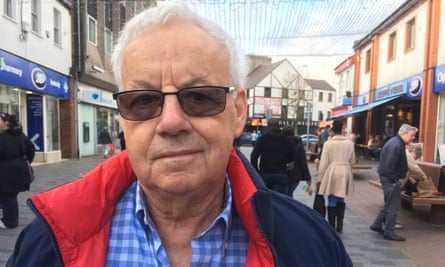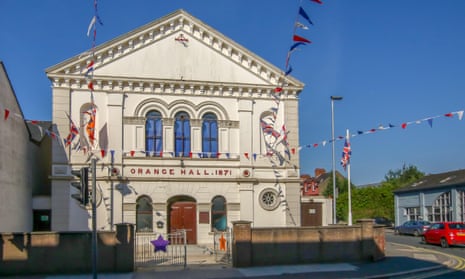The constituency of Lagan Valley, a Democratic Unionist Party stronghold in Northern Ireland, voted overwhelmingly to leave the European Union in the 2016 referendum.
As divisions over Brexit convulsed the government on Thursday, with ministers quitting and Tory rebels plotting, people on the streets gave an emphatic verdict: it’s a complete shambles, full steam ahead.
The dream of swapping Brussels bureaucracy for buccaneering British sovereignty was in trouble, they acknowledged, but they had a solution.
“Theresa May – I hope she’s out by lunchtime,” Jim Bassett, 72, a retired painter and decorator, said on a cold, grey day in downtown Lisburn. “That deal she made, it’s a joke. The dogs in the street wouldn’t accept it. We’d be in a customs union forever.”
Janet McKittrick, 56, an unemployed cleaner, said the withdrawal deal the prime minister presented to the House of Commons was a surrender to the EU. “It’s a shambles. They need to get rid of her and put in someone who wanted to leave in the first place. They need someone who will fight for it.”
Quick GuideBrexit and backstops: an explainer
Show
A backstop is required to ensure there is no hard border in Ireland if a comprehensive free trade deal cannot be signed before the end of 2020. Theresa May has proposed to the EU that the whole of the UK would remain in the customs union after Brexit, but Brussels has said it needs more time to evaluate the proposal.
As a result, the EU insists on having its own backstop - the backstop to the backstop - which would mean Northern Ireland would remain in the single market and customs union in the absence of a free trade deal, prompting fierce objections from Conservative hard Brexiters and the DUP, which props up her government.
That prompted May to propose a country-wide alternative in which the whole of the UK would remain in parts of the customs union after Brexit.
“The EU still requires a ‘backstop to the backstop’ – effectively an insurance policy for the insurance policy. And they want this to be the Northern Ireland-only solution that they had previously proposed,” May told MPs.
Raising the stakes, the prime minister said the EU’s insistence amounted to a threat to the constitution of the UK: “We have been clear that we cannot agree to anything that threatens the integrity of our United Kingdom,” she added.
It was a common refrain: the problem with Brexit was not that it was a fantasy, a political project sold on false pretences now colliding with reality, but that May and her negotiators were doing it wrong.
“The prime minister couldn’t be trusted,” said James Tinsley, a DUP councillor, speaking from the constituency office of Jeffrey Donaldson, the party’s chief whip in Westminster. “The more you look at the deal the more worrying it becomes. Northern Ireland would have been set adrift if it went through. I’m very encouraged to see so many ministers resigning.”

According to this view, the unpalatable parts of the 585-page withdrawal document unveiled on Wednesday were evidence not of Brexit’s destructive price but of betrayal by May, who had originally campaigned to stay in the EU.
“It’s like asking a rugby player to play football,” said Alex Kelly, 59, an insurance salesman. “We put a remainer in to do Brexit. We should not leave on these terms. It’s a joke.”
Did he regret voting to leave? Kelly paused. “The way things stand now, yes. But if there was another referendum I’d still vote to come out.”
It was the closest thing to Brexit remorse in the Guardian’s straw poll. Responses broke into three categories: frustrated, determined Brexiters; despairing, wistful remainers; and people who ran away, one literally screaming, at the word Brexit.
“God, no, please, I’ve nothing to say. I’m just tired of the whole thing,” said a retired teacher who declined to give her name.
Most Northern Ireland voters – 56% – voted to stay in the EU. But most DUP voters voted to leave. Their voice prevailed in Lagan Valley, a clutch of towns and villages south of Belfast, where 53% voted to leave.
That desire appears undimmed and possibly even bolstered by the Conservative party’s psychodrama.
The stated reasons to quit varied: fewer immigrants; less cash funnelled to Brussels; asserting British identity.
Donaldson – a potential successor to Arlene Foster as DUP leader – can threaten to topple May and possibly trigger an election knowing his seat is safe. The former assistant to Enoch Powell is an adept tactician who carved his political rise by opposing the Good Friday agreement and defecting from the Ulster Unionist party to the ascendant DUP.

Many analysts think the party needlessly painted itself – and the prime minister – into a corner by declaring any regulatory divergence from Britain a threat to the UK’s constitutional integrity. Intentional or not, playing the unionist card helps distract attention from the cash-for-ash scandal which has tainted the party’s image with revelations of dysfunction and cronyism.
“DUP voters don’t change their minds about very much,” said Trevor Lunn, an Alliance party politician and assembly member for Lagan Valley. Brexit was bad for local dairy farmers who exported most of their produce and made a united Ireland more possible, yet the DUP clung to it, said Lunn. “They’re doing Sinn Féin’s work for them.”
Lisburn’s downtown wears its Britishness proudly. Union jacks hang from lamp-posts. Statues of colonial and Ulster Defence Regiment soldiers adorn plinths.
The town’s original, Gaelic name, Lios na gCearrbhach, means ringfort of the gamblers. Arguably an apt description for voters happy to roll the dice with Jacob Rees-Mogg, a key Brexiter who has called for a vote of no confidence in the prime minister.
May’s Brexit deal would yoke Northern Ireland closer to the Republic – an existential threat, said Hugh Mills, 72, a retired mechanic. “An absolute disaster. We’ll have different rules to the rest of the UK and drift towards the south.”
Toppling the prime minister, he conceded, might deepen the mess. Was he beginning to doubt the value of Brexit? The question startled him. “No.”
